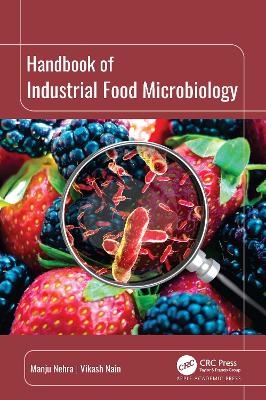
Handbook of Industrial Food Microbiology
Apple Academic Press Inc. (Verlag)
978-1-77491-526-4 (ISBN)
This new reference volume, Handbook of Industrial Food Microbiology, introduces industrial microbiology in the food industry. The techniques and technologies discussed in the book focus on production, processing, and recovery of food industry metabolites (primary or secondary). The process of alcohol production, fermentation metabolites, and drug delivery components through food are the main highlights of the book. The authors use their research and academic experience in food science and technology research and other areas of applied microbiology to serve as a foundation for this volume.
The volume first provides an introduction to and history of industrial food microbiology and goes on to discuss the biology of industrial food microbiology, food fermentation systems, microbial production of metabolites, and downstream processing. The book lays out the principles of overproduction of metabolites in the food industry and also addresses biomass production, immobilization of enzymes in food systems, and waste treatment in the food industries.
The volume clearly covers the elements and basic concepts of biology and microbiology for the benefit of students who may not be familiar with the biological sciences that act as base of industrial microbiology, such as, for example, graduates of chemical and civil engineering.
Intended for undergraduates and beginning graduate students in chemical engineering, microbiology, and biotechnology, the volume will also be of interest to those who are studying pharmacy, biochemistry, and general biology. Students and professionals in the fields of civil engineering and public health will be interested in the section on waste disposal.
Manju Nehra, PhD, is Chairperson of the Department of Food Science and Technology at Chaudhary Devilal University, Sirsa, Haryana, India. Her professional career spans around 14 years, for which she has been an academician throughout. She currently actively working on new product development from traditional Indian crops, fruits, and vegetables and improving the livelihood of farmers and rural women by providing knowledge about minimal processing and preserving techniques through lectures and workshops. She has participated in various national and international conferences and presented her research work in oral talks and posters. She has more than 40 research papers in journals of national and international repute. She has five books to her credit. She is actively contributing to her university administration by providing services as Director of Youth Welfare. She is actively involved in curriculum development and nutrition counseling. Her website informs the public about the changing scenario of human nutrition. Dr. Nehra is associated with various professional bodies like Association of Food Scientists & Technologists, Association of Microbiologists of India, and Punjab Science Congress and provides consultancy services to various agro-based industries. She has a profound interest in teaching, student counseling, environment conservation, and traveling, besides hygiene and nutrition. She completed her BSc in the medical stream at Kurukshetra University, Kurukshetra, and her MSc and PhD in Food Technology at Guru Jambheshwar University of Science and Technology, Hisar, India. Her research work was related to the efficacy of natural antioxidants in enhancing the shelf life of oils. Vikash Nain, PhD, is working as an Assistant Professor (contract) in the Food Science and Technology Department at Chaudhary Devilal University, Sirsa, Haryana, India. He has also worked as a Teaching Associate in the Department of Food Technology at Guru Jambheshwar University of Science & Technology, Hisar, India. He has various national and international publications to his credit. He has contributed his valuable suggestions and guidance in mentoring postgraduate students’ research projects to fulfill their academic requirements. Presently he is working on the development and characterization of starch nanoparticles and their application in biodegradable films, value addition in product development such as protein-rich new product development, and incorporation of indigenous medicinal components in traditional foods. He had an experience of more than ten years in the field of food science and technology and served as a consultant for the local food industries, with an emphasis on food sanitation and food safety.
1.Introduction of Industrial Food Microbiology 2. History of Industrial Food Microbiology 3. Biology of Industrial Food Microbiology 4. Food Fermentation Systems 5. Fermentation Raw Materials of the Food Industry 6. Microbial Production of Metabolites 7. Downstream Processing for Food Products 8. 8 Principles of Overproduction of Metabolites in the Food Industry 9. Biomass Production in the Food Industry 10. Immobilization of Enzymes in Food Systems 11. Waste Treatment in the Food Industries
| Erscheinungsdatum | 10.07.2024 |
|---|---|
| Zusatzinfo | 12 Tables, black and white; 9 Illustrations, color; 27 Illustrations, black and white |
| Verlagsort | Oakville |
| Sprache | englisch |
| Maße | 156 x 234 mm |
| Gewicht | 640 g |
| Themenwelt | Schulbuch / Wörterbuch |
| Naturwissenschaften ► Biologie ► Mikrobiologie / Immunologie | |
| Technik ► Lebensmitteltechnologie | |
| ISBN-10 | 1-77491-526-X / 177491526X |
| ISBN-13 | 978-1-77491-526-4 / 9781774915264 |
| Zustand | Neuware |
| Informationen gemäß Produktsicherheitsverordnung (GPSR) | |
| Haben Sie eine Frage zum Produkt? |
aus dem Bereich


